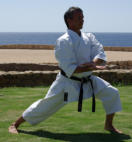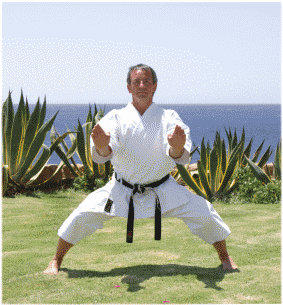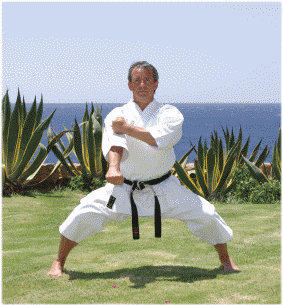






karatekata


Gojushiho Dai
Meaning of the name
54 Steps (big)
Moves: 72
Classification
Shorin-Ryu
Style
Shotokan
Level
Nijushiho
The
here
described
Gojushiho
Dai
uses
Shihon
Nukite
in
Zenkutsu
Dachi
and
is
similar
to the Gojushiho of Shito-Ryu.
The
fact
that
in
all
other
cases
where
a
Kata
is
known
in
a
Dai
and
a
Sho
Version,
the
Dai
Version
is
more
similar
to
the
original
Version,
supports
the
opinion
of
Master
Hirokazu
Kanazawa,
that
this
version
is
the
real
or
former
Gojushiho
Dai.
Because
of
the
fact
that
Kanazwa
did
study
Shotokan
under
the
eyes
of
Gichin
Funakoshi
himself
his opinion has a remarkable value.
It's unknown beside of rumors why the names has been changed.
As
the
Kata
comes
original
from
Aragaki-te
(Useishi)
it
should
be
count
to
Naha-te.
But for Shuri-te it’s Kihon has changed as much that this is not correct any more.
In
first
view
it
seems
to
be
easy
to
learn
the
Kata,
but
in
real
it's
very
difficult
and
keeps a lot of time to develop the correct dynamic of the techniques.
For more Details:
Shito Ryu Gojushiho

Gojushiho Sho
Meaning of the name
54 Steps (small)
Moves: 73
Classification
Shorin-Ryu
Style
Shotokan
Level
Nijushiho
The
here
described
Gojushiho
Sho
uses
Ippon
Nukite
in
Neko
Ashi
Dachi
and
temporarly has been named Hotaku (woodpeaker) by Gichin Funakoshi.
And
it's
easy
to
image
a
woodpeaker
hitting
a
tree
with
his
beak
by
seeing
Ippon
Nukite technique.
Though
the
Kata
is
almost
identical
to
Gojushiho
Dai
in
optical
view,
the
Enbusen
is
very
different.
The
reason
for
this
ist
the
use
of
Neko
Ashi
Dachi.
Also
it
is
the
only
Kata of Shotokan where Washide is included.
For more Details:
Shito Ryu Gojushiho
Rumors:
In
the
80th
there
was
a
rumor
that
the
names
of
the
Kata
has
been
changed,
because
a
competitor
did
call
the
wrong
name.
For
to
avoid
disqualification
officials
from
Shotokan did confirm the name. So the changing of the names was fact.
The
source
of
this
rumor
is
unknown,
so
it
is
not
without
doubts
and
has
to
take
carefully.
On
the
other
hand,
every
style
has
the
right
to
create
an
own
Karate,
to
take
Kata
from other styles, to change them and even to rename them.



Hangetsu
Meaning of the name
Half moon
Moves: 44
Classification
Shorin-Ryu
Style
Shotokan
Level
Advanced
Hangetsu
is
identical
to
the
Seishan
of
Shuri-te
which
has
not
more
than
a
very
little
similarity
to
the
Seisun
of
Nahe-te.
So
there
are
misunderstandigs
of
the
roots
of
Hangetsu
as
a
Naha-te
Kata.
Compared
with
Seishan
Hangetsu
shows
difference
in
the
midsection
where
turnings
on
one
leg
will
be
done.
In
Shotokan
it's
the
only
Kata
where
strong
breathing
techniques
are
in
use
which
reminds
to
the
kind
of
breathing
of
Naha-te.
The
name
of
the
Kata
comes
from
the
name
of
the
used
stance
Hangetsu
Dachi
(half
moon
stance).
It's
a
very
strong
stance
and
good
for
to
break
the
opponents
balance.
Because
of
the
specialities
of
the
Kata
we
can
see
it
as
a
very
valuable Kata of Shotokan.
For more Details:
Seishan


Meikyo
Meaning of the name
Cleaning the Mirror
Moves: 37
Classification
Shorin-Ryu
Style
Shotokan
Level
Medium
It’s
often
said
that
Meikyo
is
the
Shotokan
version
of
Kata
Rohai.
Reason
for
this
is
a
similiar
movement
at
the
beginning
of
the
both
Kata.
But
this
is
the
only
similiarity
to
Rohai.
Fact
is,
that
Yasutsune
Itosu
as
a
student
of
Matsumura
did
learn
Matsumura’s
version
of
Rohai.
Itosu
himself
did
create
the
Rohai
Shodan,
which
is
much
shorter
than
the
original. And alss he made Rohai Nidan and Rohai Sandan.
In
counterpart
to
the
Naifanchin
Kata
which
has
been
separated
in
three
parts,
Itosu
did
create
two
completly
new
Rohai
Kata,
which
are
not
comparable
to
Rohai
or
Rohai
Shodan.
Watching
the
three
Itosu
Kata
Rohai
Shodan,
Nidan
and
Sandan
we
find
all
techniques and concepts which we find in Kata Meikyo.
Because
of
this
I
like
to
say
that
this
three
Rohai
Kata
are
in
a
close
relationship
to
the
Kata
Meikyo.
And
that
the
Kata
Meikyo
is
a
summary
of
them.
Though
in
Meikyo
the
Sagi
Ashi
Dachi,
of
the
traditional
Rohai,
is
missing.
Furthermore
Meikyo
includes
with
the
Sankaku
Tobi
a
very
special
way
of
jumping.
In
this
jump
a
special
turnstile
is
in
use
and
so
it's
in
fact
possible
to
jump
in
a
kind
of
horizontal
curved
arched.
And
this allows the using of a special throwing technique on the end of the jump.
It's
not
for
sure
who
made
the
Kata
Meikyo.
But
it
is
to
suppose
that
the
Kata
has
been
made
in
the
Shotokan
style,
based
on
the
contacts
to
the
Shito-Ryu
school
of
Kenwa Mabuni.
As
a
candidate
for
the
development
of
Meikyo
Yoshitaka
Funakoshi
could
be
placed
into the first row.
For more Details:
Rohai Shodan
Rohai Nidan
Rohai Sandan
Note:
No
proof
is
known
that
the
Kata
Meikyo
Nidan
and
Meiyko
Sandan,
which
come
public
in 90th by Tetsuhiko Asai are historical Kata. Even Meikyo itself ins’t really historic.
The
roots
of
these
Kata
are
unknown
but
there
are
hinds
that
Tetsuhiko
Asai
has
to
do
with
it.
2002
I
met
Asai
personally
and
did
have
a
very
good
talk
with
him
during
dinner.


Nijushiho
Meaning of the name
24 steps
Moves: 38
Classification
Shorin-Ryu
Style
Shotokan
Level
Nijushiho
Nijushiho
has
been
developed
from
Niseishi
from
the
Shito-Ryu
style.
This
happend,
as
well
as
by
some
more
Kata,
because
of
Gichin
Funakoshis
connection
to
Kenwa
Mabuni.
The
changes
we
see
is
in
stances
and
the
sidewise
movements
in
Kiba
Dachi
performing
Tate
Empi,
Gedan
Barai.
This
Yori
Ashi
movement
don’t
exist
in
the
original
version,
which
also
prefers
Mae
Geri.
The
changing
to
Yoko
Gery
was
made
by
Tetsuhiko
Asai.
According
to
some
Shotokan
Master
the
Kata
should
be
done
without
any rest, like flowing water.
For more Details:
Nijushiho

Sochin
Meaning of the name
Calm power
Moves: 42
Classification
Shorin-Ryu
Style
Shotokan
Level
Nijushiho
A
lot
of
rumours
for
the
roots
of
Sochin
exists.
But
it
seems
to
be
sure
that
it
is
a
work
of
Yoshitaka
Funakoshi.
So
it
has
nothing
to
do
with
the
Sochin
from
Aragaki.
Shotokan
Sochin
is
a
new
Kata.
It
teaches
a
powerful
kind
of
fighting
with
techniques
for
close
combat.
The
performance
of
Nihon
zuki
in
Fudo
Dachi
(Sochin
Dachi)
needs
a
difficult
using
of
the
hips.
The
Kata
demands
a
good
balance
for
the
turnings.
Especially by doing Yoko Geri. Also the power of the legs are asked for doing the Kata.


Unsu
Meaning of the name
Clouds storm
Moves: 58
Classification
Shorin-Ryu
Style
Shotokan
Level
Nijushiho
The
Unsu
got
a
lot
of
changings
in
Shotokan.
Many
techniques
and
combinations
are
recreated.
So
the
original
Ushiro
Geri
has
been
exchanged
with
Mawashi
Geri.
And
a
lot
of
very
fine
techniques
are
no
more
straight.
The
end
of
the
Kata
has
been
cut
on
the
end
so
it’s
a
bit
shorter
than
Unsu.
Also
the
dynamic
has
been
changed
and
more
power
is
in
use.
Done
in
advanced
level
the
Kata
should
be
performed
without
any
stop like Nijushiho.
For more Details:
Shito Ryu Unshu



Wankan
Meaning of the name
Kings Crown
Moves: 28
Classification
Shorin-Ryu
Style
Shotokan
Level
Medium
The
Wankan
has
been
developede
from
Kata
Matsukaze.
But
Wankan
is
shorter
and
some
combinations
has
been
exchanged
with
completly
new
one.
But
it's
still
to
see
that
it
has
been
developed
from
Matsukaze.
Though
the
changings
are
as
many
that
it
is
possible
to
see
it
as
a
new
Kata.
And
though
the
Kata
is
very
short
it
has
an
interesting
and
advanced
fighting
system.
But
some
techniques
like
Ashi
Barai
at
the
beginning
will
be
done
hidden.
That
means
the
movement
will
be
start
but
not
performed completly.
For more Details:
Matsukaze

karatekata








Meaning of the name
54 Steps (big)
Moves: 72

Gojushiho Dai
Classification
Shorin-Ryu
Style
Shotokan
Level
Advanced
The
here
described
Gojushiho
Dai
uses
Shihon
Nukite
in
Zenkutsu
Dachi and is similar to the Gojushiho of Shito-Ryu.
The
fact
that
in
all
other
cases
where
a
Kata
is
known
in
a
Dai
and
a
Sho
Version,
the
Dai
Version
is
more
similar
to
the
original
Version,
supports
the
opinion
of
Master
Hirokazu
Kanazawa,
that
this
version
is
the
real
or
former
Gojushiho
Dai.
Because
of
the
fact
that
Kanazwa
did
study
Shotokan
under
the
eyes
of
Gichin
Funakoshi
himself
his
opinion has a remarkable value.
It's unknown beside of rumors why the names has been changed.
As
the
Kata
comes
original
from
Aragaki-te
(Useishi)
it
should
be
count
to
Naha-te.
But
for
Shuri-te
it’s
Kihon
has
changed
as
much
that this is not correct any more.
In
first
view
it
seems
to
be
easy
to
learn
the
Kata,
but
in
real
it's
very
difficult
and
keeps
a
lot
of
time
to
develop
the
correct
dynamic
of
the
techniques.
For more Details:
Shito Ryu Gojushiho


Meaning of the name
54 Steps (small)
Moves: 73

Gojushiho Sho
Classification
Shorin-Ryu
Style
Shotokan
Level
Advanced
The
here
described
Gojushiho
Sho
uses
Ippon
Nukite
in
Neko
Ashi
Dachi
and
temporarly
has
been
named
Hotaku
(woodpeaker)
by
Gichin Funakoshi.
And
it's
easy
to
image
a
woodpeaker
hitting
a
tree
with
his
beak
by
seeing Ippon Nukite technique.
Though
the
Kata
is
almost
identical
to
Gojushiho
Dai
in
optical
view,
the
Enbusen
is
very
different.
The
reason
for
this
ist
the
use
of
Neko
Ashi
Dachi.
Also
it
is
the
only
Kata
of
Shotokan
where
Washide
is
included.
For more Details:
Shito Ryu Gojushiho
Rumors:
In
the
80th
there
was
a
rumor
that
the
names
of
the
Kata
has
been
changed,
because
a
competitor
did
call
the
wrong
name.
For
to
avoid
disqualification
officials
from
Shotokan
did
confirm
the
name.
So
the
changing of the names was fact.
The
source
of
this
rumor
is
unknown,
so
it
is
not
without
doubts
and
has to take carefully.
On
the
other
hand,
every
style
has
the
right
to
create
an
own
Karate,
to
take
Kata
from
other
styles,
to
change
them
and
even
to
rename
them.


Meaning of the name
Half moon
Moves: 44

Hangetsu
Classification
Shorin-Ryu
Style
Shotokan
Level
Advanced
Hangetsu
is
identical
to
the
Seishan
of
Shuri-te
which
has
not
more
than
a
very
little
similarity
to
the
Seisun
of
Nahe-te.
So
there
are
misunderstandigs
of
the
roots
of
Hangetsu
as
a
Naha-te
Kata.
Compared
with
Seishan
Hangetsu
shows
difference
in
the
midsection
where
turnings
on
one
leg
will
be
done.
In
Shotokan
it's
the
only
Kata
where
strong
breathing
techniques
are
in
use
which
reminds
to
the
kind
of
breathing
of
Naha-te.
The
name
of
the
Kata
comes
from
the
name
of
the
used
stance
Hangetsu
Dachi
(half
moon
stance).
It's
a
very
strong
stance
and
good
for
to
break
the
opponents
balance.
Because
of
the
specialities
of
the
Kata
we
can
see
it
as
a
very
valuable Kata of Shotokan.
For more Details:
Seishan


Meaning of the name
Cleaning the Mirror
Moves: 37

Meikyo
Classification
Shorin-Ryu
Style
Shotokan
Level
Medium
It’s
often
said
that
Meikyo
is
the
Shotokan
version
of
Kata
Rohai.
Reason
for
this
is
a
similiar
movement
at
the
beginning
of
the
both
Kata. But this is the only similiarity to Rohai.
Fact
is,
that
Yasutsune
Itosu
as
a
student
of
Matsumura
did
learn
Matsumura’s
version
of
Rohai.
Itosu
himself
did
create
the
Rohai
Shodan,
which
is
much
shorter
than
the
original.
And
alss
he
made
Rohai Nidan and Rohai Sandan.
In
counterpart
to
the
Naifanchin
Kata
which
has
been
separated
in
three
parts,
Itosu
did
create
two
completly
new
Rohai
Kata,
which
are
not
comparable
to
Rohai
or
Rohai
Shodan.
Watching
the
three
Itosu
Kata
Rohai
Shodan,
Nidan
and
Sandan
we
find
all
techniques
and
concepts which we find in Kata Meikyo.
Because
of
this
I
like
to
say
that
this
three
Rohai
Kata
are
in
a
close
relationship
to
the
Kata
Meikyo.
And
that
the
Kata
Meikyo
is
a
summary
of
them.
Though
in
Meikyo
the
Sagi
Ashi
Dachi,
of
the
traditional
Rohai,
is
missing.
Furthermore
Meikyo
includes
with
the
Sankaku
Tobi
a
very
special
way
of
jumping.
In
this
jump
a
special
turnstile
is
in
use
and
so
it's
in
fact
possible
to
jump
in
a
kind
of
horizontal
curved
arched.
And
this
allows
the
using
of
a
special
throwing technique on the end of the jump.
It's
not
for
sure
who
made
the
Kata
Meikyo.
But
it
is
to
suppose
that
the
Kata
has
been
made
in
the
Shotokan
style,
based
on
the
contacts
to the Shito-Ryu school of Kenwa Mabuni.
As
a
candidate
for
the
development
of
Meikyo
Yoshitaka
Funakoshi
could be placed into the first row.
For more Details:
Rohai Shodan Rohai Nidan Rohai Sandan
Note:
No
proof
is
known
that
the
Kata
Meikyo
Nidan
and
Meiyko
Sandan,
which
come
public
in
90th
by
Tetsuhiko
Asai
are
historical
Kata.
Even
Meikyo itself ins’t really historic.
The
roots
of
these
Kata
are
unknown
but
there
are
hinds
that
Tetsuhiko
Asai
has
to
do
with
it.
2002
I
met
Asai
personally
and
did
have a very good talk with him during dinner.


Meaning of the name
24 steps
Moves: 38

Nijushiho
Classification
Shorin-Ryu
Style
Shotokan
Level
Advanced
Nijushiho
has
been
developed
from
Niseishi
from
the
Shito-Ryu
style.
This
happend,
as
well
as
by
some
more
Kata,
because
of
Gichin
Funakoshis
connection
to
Kenwa
Mabuni.
The
changes
we
see
is
in
stances
and
the
sidewise
movements
in
Kiba
Dachi
performing
Tate
Empi,
Gedan
Barai.
This
Yori
Ashi
movement
don’t
exist
in
the
original
version,
which
also
prefers
Mae
Geri.
The
changing
to
Yoko
Gery
was
made
by
Tetsuhiko
Asai.
According
to
some
Shotokan
Master the Kata should be done without any rest, like flowing water.
For more Details:
Nijushiho

Meaning of the name
Calm power
Moves: 42

Sochin
Classification
Shorin-Ryu
Style
Shotokan
Level
Advanced
A
lot
of
rumours
for
the
roots
of
Sochin
exists.
But
it
seems
to
be
sure
that
it
is
a
work
of
Yoshitaka
Funakoshi.
So
it
has
nothing
to
do
with
the
Sochin
from
Aragaki.
Shotokan
Sochin
is
a
new
Kata.
It
teaches
a
powerful
kind
of
fighting
with
techniques
for
close
combat.
The
performance
of
Nihon
zuki
in
Fudo
Dachi
(Sochin
Dachi)
needs
a
difficult
using
of
the
hips.
The
Kata
demands
a
good
balance
for
the
turnings.
Especially
by
doing
Yoko
Geri.
Also
the
power
of
the
legs
are
asked for doing the Kata.



Meaning of the name
Clouds storm
Moves: 58

Unsu
Classification
Shorin-Ryu
Style
Shotokan
Level
Advanced
The
Unsu
got
a
lot
of
changings
in
Shotokan.
Many
techniques
and
combinations
are
recreated.
So
the
original
Ushiro
Geri
has
been
exchanged
with
Mawashi
Geri.
And
a
lot
of
very
fine
techniques
are
no
more
straight.
The
end
of
the
Kata
has
been
cut
on
the
end
so
it’s
a
bit
shorter
than
Unsu.
Also
the
dynamic
has
been
changed
and
more
power
is
in
use.
Done
in
advanced
level
the
Kata
should
be
performed without any stop like Nijushiho.
For more Details:
Shito Ryu Unshu


Meaning of the name
Kings Crown
Moves: 28

Wankan
Classification
Shorin-Ryu
Style
Shotokan
Level
Medium
The
Wankan
has
been
developede
from
Kata
Matsukaze.
But
Wankan
is
shorter
and
some
combinations
has
been
exchanged
with
completly
new
one.
But
it's
still
to
see
that
it
has
been
developed
from
Matsukaze.
Though
the
changings
are
as
many
that
it
is
possible
to
see
it
as
a
new
Kata.
And
though
the
Kata
is
very
short
it
has
an
interesting
and
advanced
fighting
system.
But
some
techniques
like
Ashi
Barai
at
the
beginning
will
be
done
hidden.
That
means
the
movement will be start but not performed completly.
For more Details:
Matsukaze


















































































